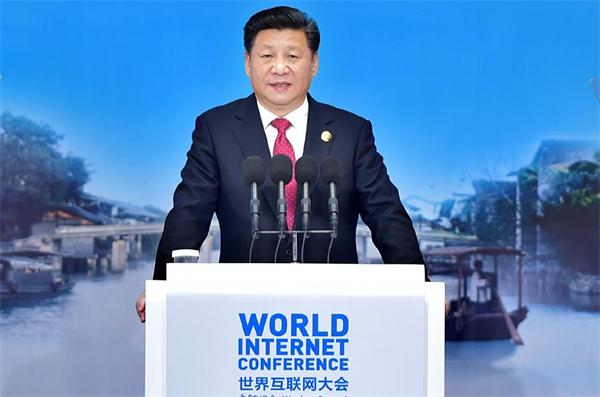True value of information rides on interconnectivity
Updated: 2015-12-17 07:46
(China Daily)
|
|||||||||||
 |
|
President Xi Jinping delivers a keynote speech at the opening ceremony of the Second World Internet Conference in Wuzhen township, East China's Zhejiang province, Dec 16, 2015. [Photo/Xinhua] |
President Xi Jinping loves to talk about a "community of shared destiny", and now he is applying it to cyberspace. This is good news to everyone worried about a potential China-US, or China-West, standoff in the virtual world.
The controversial concept of cyber sovereignty aside, it should be reassuring for them to learn China wants peace in the global public sphere.
For anyone suspicious of Chinese intentions in cyberspace, Xi's show of willingness to engage in constructive interactions with the outside world is an overture worth serious response.
There are plenty of issues on which China disagrees with others. But that does not mean all these gaps are unbridgeable. At least they can create a protocol for peaceful co-existence and prevent the feared "arms race" in cyberspace from materializing.
Since Xi looks toward China and the rest of the world forging a "community of shared future", there should be room for candid dialogue over shared concerns, among which is the freedom-regulation conundrum.
China has taken great pains to strike a balance between these two apparently irreconcilable concerns. But regulators' preoccupation with "order" and "unanimity" has to be reconciled with the open and democratic nature of the Internet.
Xi was correct in stating that, "the essence of the Web lies in interconnection, the value of information lies in interconnectivity". Addressing the "digital gap" is not just about infrastructure. It is also about access.
Xi placed equal emphasis on freedom and order, which was impeccable logic-wise. "We should not only respect netizens' rights to communicate ideas and express their wills, but also build a fine online order, which is conducive to guaranteeing Internet users' legal rights and interests," he said, adding that the Internet is not beyond the law.
Infiltration of harmful information, the recent dissemination of terrorist messages in particular, has put fresh pressure on Internet regulators worldwide, making the balance between freedom and order trickier than ever.
Terrorist threats can be a handy justification for stricter control. But how far should regulators go in compromising constitutional liberties for a purpose like that? This is a question for every country.
The Internet is important for China not just as a virtual platform of e-commerce or any other new business model. An open, robust and healthy cyberspace is of vital significance to the country's thirst for creativity and innovativeness as well.
Related Stories
Youth main force of Internet development: Chinese cyberspace official 2015-12-16 19:42
China turns cyberspace truly global 2015-12-16 15:17
Xi explains China's balanced cyberspace governance 2015-12-16 13:27
China key to turning cyberspace truly global 2015-12-16 10:03
Today's Top News
Germany to spend 17b euros on refugees in 2016
Demand booms for high-end financial talent
Abe expresses apology for Korean victims of comfort women
North China encounters gas supply shortage
Asian Infrastructure Investment Bank launched
Russia says it has proof of Turkey's support for IS
Investors adjusting expectations
India and Russia eye nuclear, helicopter deals
Hot Topics
Lunar probe , China growth forecasts, Emission rules get tougher, China seen through 'colored lens', International board,
Editor's Picks

|

|

|

|

|

|






